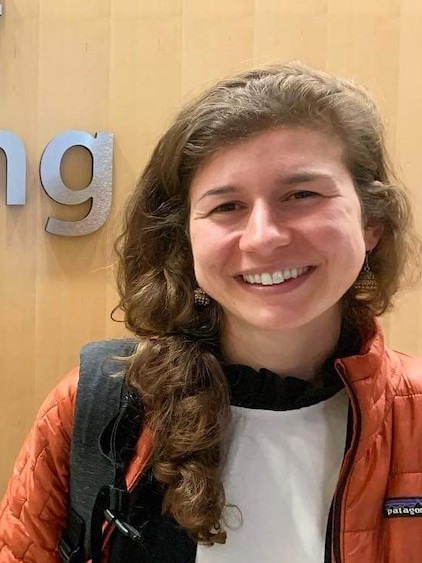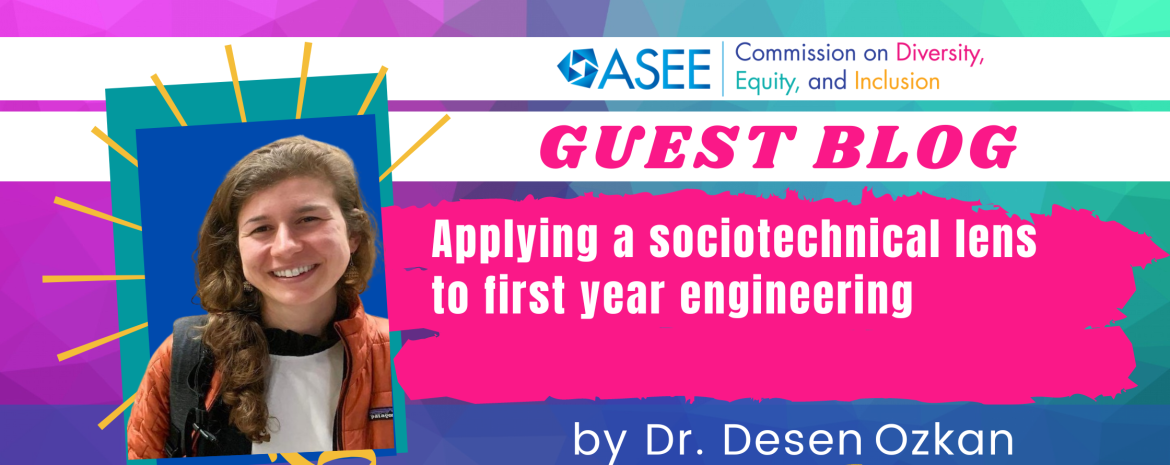Applying a sociotechnical lens to first year engineering
W.E.B. Du Bois first outlined a notion of double-consciousness in 1903, more than 100 years ago. Why is it that engineering students, specifically minoritized engineering students describe similar notions of this twoness? In this blog post, we go back to Du Bois’ critique of education to contextualize current practices of STEM education and how they land differently for our students.
Sociotechnical engineering is not new. It builds on work outlining the social/technical dualisms in engineering. As many scholars have pointed out, students come away from engineering programs with notions that engineering is objective and neutral as it solves the problems of the world. In our recent ASEE paper, Chelsea Andrews and I focus on a different but related type of dualism, that in students’ sense of belonging.
First, we look to W.E.B. Du Bois and his notion of double-consciousness. Du Bois was a sociologist, historian, and Black liberation activist whose arguments around self and education resonate deeply today. We draw on his description of double-consciousness, which he describes in ‘The Souls of Black Folks.’
A peculiar sensation, this double-consciousness, this sense of always looking at one’s self through the eyes of others, of measuring one’s soul by the tape of a world that looks on in amused contempt and pity. One ever feels his twoness. (1903, p. 6)
Du Bois related this to education by critiquing the purpose of education. One of the essays in Souls of Black Folks was a case against Booker T. Washington, a prominent American educator, who was promoting industrial education for economic uplift for Black folks. Du Bois’ critique of Washington’s model of education resonates with models of education today, particularly STEM education. He states:
I insist that the object of all true education is not to make men carpenters, it is to make carpenters men; there are two means of making the carpenter a man, each equally important: the first is to give the group and community in which he works, liberally trained teachers and leaders to teach him and his family what life means; the second is to give him sufficient intelligence and technical skill to make him an efficient workman (Du Bois, 1903, p. 200).
From Du Bois, we again ask, what is education for? Is to reduce people to their economic contribution to society? Or is to provide community and instill belonging?
As we fast forward through time from industrial education to STEM education, we see similar economic assumptions that resonate with Du Bois’ critique in 1903. The main two are that broadening STEM will lead to more innovation which is assumed to grow the national economy (Vakil & Ayers, 2019). The second, positions a career in STEM as a path for upward economic mobility (Vakil & Ayers, 2019). Both of these underlying motivations take a deficit stance toward historically marginalized folks in the sense that individuals must assimilate into engineering, which remains an unchanging, neutral discipline instead of one that changes to reflect the values of the society in which it sits.
We contend that the sociotechnical dualism of engineering education reinforces a value system that defines a STEM person in a narrow way that can be counter to the lived experiences of minoritized students. To that end, how can we as engineering educators make meaningful changes to a curriculum that instills a sense of belonging for minoritized students in engineering—one that places value on who they are as people?
Vakil and Ayers challenge and invite us to not just think about the dualism of curricular content – so in integrating the socio- and technical, but also to attend to the identities of students as they develop into STEM people that includes their politics, their activism, their artistry or whatever else. How might we teach both so that students can be both?
At Tufts University, we have undergone a sociotechnical revision in the first-year engineering computation class. We have worked to bring light to the sociopolitical context and consequence of engineering. We have worked to pull back the curtain on the human element of engineering, and the countless decisions that get rendered invisible by engineering’s solely technical and neutral portrayal. However, this revision has landed differently for different students. In our 2022 ASEE LEES paper, we worked to center the perspectives of seven minoritized students who elected to be interviewed after the revision. Their perspectives have heavily influenced our curricular and research decisions moving forward in this project.
Engineering (and engineering education) is a discipline made of people making decisions. Everyday, we make countless decisions. But each decision is also an opportunity. An opportunity to reinforce existing inequities or not. Through this sociotechnical revision, there has been an added opportunity to be transparent with students about the countless instructional decisions that make up the curriculum as well as engineering. In doing so, we try to pull back the veil of neutrality on what engineering is and how it is conveyed through instruction. Through this transparency, we contend that students see opportunities to make change in engineering such that they bring their whole selves into this discipline.
References
Du Bois, W. E. B. (William Edward Burghardt), 1868-1963. The Souls of Black Folk; Essays and Sketches. Chicago, A. G. McClurg, 1903. New York: Johnson Reprint Corp., 1968.
About the Author
 Desen Ozkan is a Postdoctoral Researcher at the Center for Engineering Education and Outreach (CEEO) and the Institute for Research on Learning and Education (IRLI) at Tufts University. Her primary research is on interdisciplinarity and engineering decisions as they relate to broader social, political, and economic contexts. She teaches ENE-010, Deconstructing Engineering Design, STS-010 a reading lab on ‘Learning’ that centers on sociopolitical histories of STEM education, and CS-150 Data and Power: Deconstructing Surveillance.
Desen Ozkan is a Postdoctoral Researcher at the Center for Engineering Education and Outreach (CEEO) and the Institute for Research on Learning and Education (IRLI) at Tufts University. Her primary research is on interdisciplinarity and engineering decisions as they relate to broader social, political, and economic contexts. She teaches ENE-010, Deconstructing Engineering Design, STS-010 a reading lab on ‘Learning’ that centers on sociopolitical histories of STEM education, and CS-150 Data and Power: Deconstructing Surveillance.
Connect with our guest blogger
Do you want to become a guest blogger?
CDEI Guest Blog highlight future events, describe best practices, or share calls to action by CDEI members. We invite you to propose posts that share brief research highlights, reports of impactful initiatives, critical thought pieces, and resources you find useful. We especially encourage emerging scholars to share their work. If you are interested in sharing a blog or resource post, you may submit your proposal here. All posts are screened and edited.

